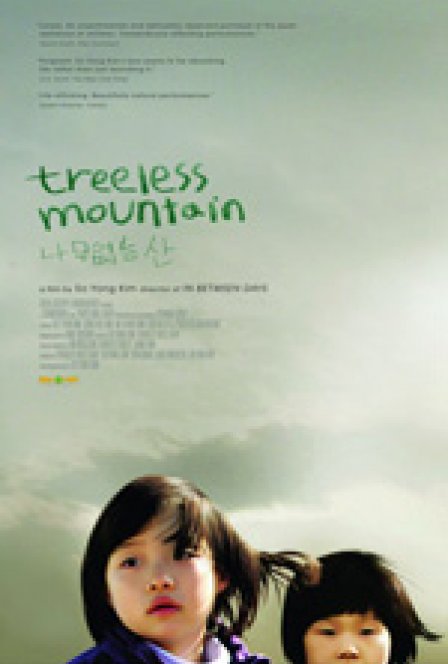Words are hardly necessary in Treeless Mountain, So Yong Kim’s poignant and wonderful film about the resilience and fragility of children, in which the tragedy of a childhood lost is communicated silently and wholly through the plaintive, hauntingly expressive faces of its two young leads.
The relatively simple story packs a gut-wrenching punch. When their mother picks up and leaves to search for their father, two young sisters, Jin (Hee-yeon Kim) and Bin (Song-hee Kim), are left in the care of their alcoholic, ineffectual aunt (Mi-hyang Kim) who is largely unconcerned with their well-being and exploits their presence primarily for personal gain. The girls cling to one hope: their mother has left behind a red piggy bank, telling them that she will be back when it is full.
Earnestly believing that by filling up the piggy bank they might summon their mother’s return, Jin and Bin begin a sort of rudimentary enterprise collecting and grilling grasshoppers, treats which they then sell to schoolboys. This warped capitalist initiation signals an end of innocence, an all-too-sudden introduction to a world in which survival is predicated upon transaction and in which, they believe with heartbreaking naïveté, a mother’s love can be “bought” back.
Director So Yong Kim gently stylizes her frame to convey the girls’ vulnerability, often setting them against vast cityscapes in wide shots that effectively emphasize their smallness in the world. She also employs a restrained color palette of light blues, pastel pinks and muted purples that suggest a faded childhood, worn through and sullied like the powder blue princess gown that Bin perpetually dons. Using a host of richly metaphoric details—the “treeless mountain” of the title (a mound of rubble upon which the girls “plant” a tree branch), grasshoppers trapped in a glass jar, a broken eye on the votive piggy bank—Kim subtly reinforces themes of false hope, helplessness, and the loss of childhood.
The performances from the two young leads are touchingly naturalistic—Hee-yeon Kim, as older sister Jin, has a face that is at once remarkably expressive and mysterious, conveying an infinite sadness and a stoic resolve that brings to mind child actress Ana Torrent’s remarkable turns in The Spirit of the Beehive and Cria Cuervos, films that similarly capture childhood's simultaneous wonderment and bitterness.
The landscape shots that quietly interrupt the narrative periodically suggest the vastness of the world that separates the girls from their mother—a large and imposing place that threatens to swallow them whole—but also, in their beauty, the possibility of release, the idea that somewhere out there is a place for these two lost children. Perhaps, even, a home.

